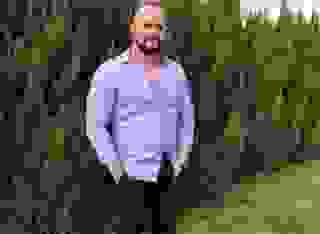Note: You can change font size, font face, and turn on dark mode by clicking the "A" icon tab in the Story Info Box.
You can temporarily switch back to a Classic Literotica® experience during our ongoing public Beta testing. Please consider leaving feedback on issues you experience or suggest improvements.
Click hereI nod, I don't dare speak for fear of losing control. Allan removes his hand from my head and turns his body around the other way. For some reason, he's decided to treat the end of the bed that's flush against the wall as the head, which means that while we were whispering he was lying down with his head at what he's designated as the bed's foot. If he would sleepthat way, we would be able to talk more easily in the future, because his head would be close to mine. But perhaps he wants to sleep with his head at the opposite end of the bed because it gives him a greater sense of distance from me—a greater sense of privacy.
I curl back up under my blanket. Eventually I manage to fall asleep.
***
Within a few days, even Allan stops talking as if there's any hope that this new location might be the staging ground for a release. It also becomes clear that judging the new location a "big improvement" was premature. Yes, we have gained some advantages by our transfer to this new place of imprisonment, but we are faced with serious problems as well.
One advantage is that we have several times more space in our new quarters than either of us has ever enjoyed as a hostage. It appears we're being held on the premises of an abandoned small business. The items of furniture against the far wall are a filing cabinet and a tall cupboard, both metallic, both empty. The guards' room, presumably, was the business's front office or reception area, while Allan and I are living in a back room—once a storeroom, maybe, or a workshop. The place has been abandoned for a long time: there are dust bunnies on the floor.
Allan has a fetish for numerical exactitude, so he uses his feet to measure the room's dimensions. The calculations involved in getting from Allan's shoe size to units of twelve inches make my math-allergic head spin, so I don't help out, I just wait for Allan to announce the result. Allan decides the room is about 21 feet long and 9 feet wide. The ceiling looks to be twice as high as we are tall, so he estimates 12 feet.
Allan has to wait to take these measurements until a few days after our arrival, once we've come to enjoy more freedom of movement. Initially, we are confined to our mattresses all the time—which is to say that we don't derive any benefit from our larger quarters apart from having more immediate personal space, which is certainly welcome. The guards don't want to hear us moving or talking at all. If the person on the bed even changes position, the creaking of the bedframe is likely to bring a guard hissing at us through the gap at the bottom of the door.
Allan and I take turns sleeping on the bed, starting our second night here. Once the guards have fallen asleep, Allan whispers to me that it isn't fair that I should always have to sleep on the floor. So we swap places, each taking his blanket with him. Within a few hours, I realize I should have thought to bring my pee bottle as well. Allan's is at hand, so I use it, but I dislike doing so: it feels both unhygienic and erotic in a perverted way. The next morning, the guards don't make any comment about our having traded places, so we keep doing it, night by night, after the evening toilet run. I move my drinking and pee bottles with me during each subsequent swap, and Allan follows suit.
We get two toilet runs a day here, not just one. This is another advantage to our new location, unsolicited and unexpected. Perhaps the guards have decided they don't mind giving us an evening toilet run because it's just the two of us; we hear no signs that there are other hostages on the premises. Or maybe these guards simply don't know that we're only "supposed" to have one toilet run a day. Also unexpectedly, the guards don't harass us to hurry up in the bathroom, they just wait for us to knock on the inside of the door to let them know we're done. The difference, I think, is owed to the fact that these guards don't hang around outside the bathroom waiting for us. Instead, they use a key to lock us inside, then they go down the hall to their room to wait in comfort for our knock, at which point they return.
From the sound of the plumbing, we can tell that the bathroom is located just beyond the short wall at the far end of our room. We reach it by walking down a hall that opens to our right when we're brought out of the back room. The hall is quite narrow, judging from how frequently I brush against the wall as the guard walks alongside me.
Although cramped, this bathroom is in most ways the best equipped that I've enjoyed in my captivity. A squat toilet—but instead of a hose, this toilet has a flushing mechanism, and there's a tiny spigot beside the toilet for personal cleaning (although for that, a hose would actually be more efficient). The bathroom has a small sink, though no mirror as usual. There's a shower as well, with an actual shower head; back in the Shouf prison, we stood under water pouring directly out of the pipe. The shower and sink have taps for both hot and cold water, but the excitement this inspires ends quickly in disillusion: there is no hot water. I'm a little puzzled to find a shower in a workplace restroom, although it makes more sense if, as Allan imagines, our back room once served as a workshop. Besides hot water, another regrettable absence in this bathroom is soap. We find some ancient leftover scraps in the shower when we arrive, but once those have melted and crumbled away, the guards don't replace them.
In addition to seeming not to know the norms for toilet runs, our new guards also seem not to know about shower day. They never tell us, "Douche," or indicate in any other way that we have their permission to bathe. By the time we've been here a week and would therefore expect to have been allowed to shower, Allan and I have both caught colds, so we wouldn't want to take a frigid shower in winter temperatures anyway for fear of becoming sicker. But we're going to need to wash eventually, more than douching over the toilet and splashing water on our faces at the sink.
Once he's recovered from his cold, Allan asks the guards if he can take a "shower,douche." Since we're not sure if our new guards understand either English or French, he supplements his bilingual request with a pantomime of soaping up under falling water. It turns out these guards don't care if or when we shower, consistent with what we have come to know is their general indifference to our needs. In this case, their indifference means we're free to shower when we like, although I'm sure that would change if they came to feel we were taking too much of their time. I decide that I will continue to take a hasty shower only once a week; I'm afraid I'll get sick again if I stand shivering under the water more often than that. Allan braves a shower only a little more frequently, a couple of times a week. Since we don't have towels, we use our pajama tops to dry off and wear our sweaters against our skin while we leave our tops hanging over an open drawer of the filing cabinet to dry.
We have only two guards here, not three. No other shift ever relieves them. The guards hardly speak to us; on the rare occasions they do, they speak in Arabic. Mostly they communicate by hissing to let us know they're displeased or clicking to tell us to get moving, like donkeys. I hate that, it's demeaning. Whenever Allan tries to communicate with the guards, he does it in both English and French, hoping they understand one language or the other.
For our first full day here, both guards are on the premises around the clock. On our second morning, after the feeding and toilet run, we hear one of the guards leave the building. The other spends the rest of the day with us. More precisely, he spends the rest of the day in the room out front, where he entertains himself with a radio and a tape player. He never enters our room, although periodically he peeks under the door to check up on us. The guard who left returns to assist with the evening feeding and toilet run. After that, again, one guard leaves the building while one remains to spend the night.
The next day, our third day here, passes the same as the second. Both guards are present for feedings and toilet runs, but only one guard spends the day with us, and only one guard stays overnight.
On the fourth morning, after completing our toilet runs and locking us into our room, both guards leave the building. At first we can't believe it. We think the guard must be sitting or lying down; we strain to hear him make some quiet sound. It's Allan's day to be on the mattress on the floor, but he motions for me to trade places with him. He bounces on the bed so that the bedframe will make noise. No one comes to the door to hiss. Allan crosses quietly to the door, eases down onto his hands and knees, listens, then peers through the gap underneath into the dimly lit room beyond.
He startles me by speaking at normal volume. "They're gone. I don't fucking believe it."
Almost instantly, Allan concocts an escape plan. He wants to try to bash through the door with the bedframe. We're both worried that the guards, or one of them, could return at any moment; but while that possibility paralyzes me, it drives Allan to take risks. This could be our one chance, he urges me. I parry with the possibility of failure. The door might be too sturdy, and the bedframe might not be sturdy enough. Since the door opens into our room, won't that make it even harder to smash down from our side? We might do enough damage to the door for the guards to see but not enough to do us any good. I remind Allan what he told me about his time in solitary confinement, how he used to get caught up imagining escape plans that only later he recognized as unrealistic. His plan to batter through the door with the bedframe might be a Strange Idea. We need to take more time to think it through.
Allan is desperately frustrated with me. But it might not be a Strange Idea, he insists, and we might not have more time. Because he needs me to help him lift the bed, I have veto power, so I use it. Allan is furious with me, which I find agonizing, but my terror of being caught makes me adamant.
Hours pass. The guards don't return. Allan cools down. I'm on edge, constantly listening for the outer door, but I'm less panicky than I was earlier. Allan says it drives him crazy that we can't know for sure if his bedframe plan will work or not without trying it. But I'm right, he concedes: there's enough risk of failure that we can't risk trying it—even though it might succeed.
He turns his attention to the question of why the guards have gone. His theory is that they've left for the day, he doesn't expect them back until the evening. He thinks these men are new to guard duty and aren't cut out for it. The way they do the toilet runs suggests they're too lazy to spend even a few minutes standing in a hall. The dismal food situation shows they don't want to make more than a minimal effort. They're probably bored out of their minds. And cold. So they've spent the last three days convincing themselves we don't need to be closely monitored—and, good for us, we've convinced them of that, so they're off. Allan predicts they'll show up for the evening feeding and toilet run, then they'll both go spend the night somewhere warmer. He's optimistic it will be this way all the time from now on.
I don't know what to think. I hope Allan's right. If he is, I observe aloud, we'll have much more time to think through possibilities for escape. I intend this remark as an olive branch.
Allan asks if I'll help him move the filing cabinet so we can look out the grate to see what's outside the building. I refuse for fear that the guards will return and catch us. But I promise that if Allan's prediction about the guards not returning until the evening proves correct, and if they leave again tomorrow morning as they did today, I'll help him move the filing cabinet then. Allan accepts this as a reasonable precaution.
Everything unfolds exactly as Allan predicted. In addition to being thrilled about the situation, he is obnoxiously self-congratulatory. "I knew it! Didn't I tell you?" he says, over and over. I tolerate the obnoxiousness because he's wearing his adorable smile. Also, because his excitement makes him "handsy"—he wants to keep touching me. While he's saying, "Didn't I tell you?" for the umpteenth time, he'll grab my shoulders, or drum on my back, or reach over to squeeze my knee or ankle while we're sitting on the bed talking.
The fact that Allan's prediction proved correct is fantastic news for us. Apart from about fifteen minutes, twice a day, when the guards turn up for feedings and bathroom trips, Allan and I are now being left to our own devices around the clock, day and night. There are even a handful of occasions when the guards come by only once a day. (That's not a good thing, though, because on those days we get only a single small meal.) As Allan remarks: The chefs would explode if they knew how much time we spend unsupervised.
Being left alone is the closest we get, as hostages, to freedom. We can talk all we like. We can move around the room all we like. It's at this point that Allan measures the room's dimensions with his feet. We resume our exercise periods, which we had to suspend when the guards were here. I like to pace in a square extending from the foot of the bed to the wall where the filing cabinet and cupboard are stored. Wearing only my black socks, in order to preserve my new woolen ones, I walk around and around for long, meditative periods. Allan jogs the same route.
Most importantly, our newfound measure of freedom allows us to explore our surroundings, searching for ways to break out to total freedom.
As I promised, I help Allan carry the filing cabinet to a position underneath the outside grate. He asks if I want to be the one to climb up to look out. Even though we're the same height, he's under the impression I weigh less than he does, I guess because I'm younger, so he thinks I'm a little less likely to damage the empty filing cabinet, which looks cheaply made. I don't want to climb up, out of cowardice. What if the guards return, unexpected, while I'm up there? Peeking through the grate is Allan's idea, he should be the one who shoulders the risk.
As it happens, I also have an extreme fear of heights, but that's too humiliating to use as an excuse. Instead, the excuse I give Allan is that I've realized I once again left my glasses behind at our last prison. Allan commiserates. Since I never wore my glasses in our cell, he completely forgot that I have (or had) them. Yeah, well, obviously I forgot, too.
Remembering how Makmoud recovered my glasses for me the first time I left them behind during a transfer, Allan encourages me to tell our guards here what happened; he'll help me with a French translation. I tell him it's not worth the bother. We still haven't figured out if the guards understand a word we say, and considering how hard it's proving to get better food and more blankets, I doubt we could get the guards to lift a finger toward the more complicated task of recovering my glasses. Besides, I don't really need my glasses. They're just for seeing long distances, and it's not as if I'll be driving a car anytime soon.
Oops. So much for using my missing glasses as an excuse not to climb up and look out the grate. My slip-up does not escape Allan's notice. "You're afraid they might come back and catch you, right?" he asks. Right, I confess, shame-faced. My acrophobia suddenly seems more mitigating than humiliating, so I add: But I'm also afraid of heights. Allan tells me I should have just said so. And I don't need to feel ashamed of my fear of being caught, either; it's perfectly natural, even rational. He asks me to warn him if the filing cabinet looks like it's starting to dent or bow under his weight.
Allan reports that the grate looks out onto an alley. To his right, he can barely glimpse the cross street. On the back of the building across from us, he can see a service entrance at ground level and windows on the upper stories. It looks like the electric light that shines through our grate at night is over that entrance. Even though it's mid-morning, there's currently no activity in the alley or on the street—a cold rain is falling. Plus, our ears had already told us that we're in a neighborhood with only light vehicular traffic.
Next, we move the cabinet across the room for a look through the grate on the opposite wall, the grate that overlooks the guards' room. By now I'm feeling safer and eager to redeem myself, so this time I climb up. My acrophobia gives me vertigo as I warily inch my way into an upright stance atop the cabinet, but I manage it by pressing myself close to the wall and staring straight ahead, scrupulously keeping my eyes away from either the floor or the ceiling. Allan makes encouraging noises: I'm doing fine, but I can stop anytime I feel like, no shame.
The grate actually overlooks the beginning of the hallway that leads to the bathroom. There's a blank wall filling half my vision, but to my left I can see into the guards' room. They have folding cots—with pillows andblankets, goddammit, which they're no longer using! Allan and I have been begging for more blankets, why won't the guards give us those?
The guards' room is cluttered with abandoned office furniture. Extending past the wall that fills most of my view, I can make out the end of a desk with an overturned table stacked on top of it. Another, narrower table stands upright against a different wall. Several wooden chairs are stacked a little precariously on top of each other in sets of three, alternating right-side-up and upside-down. There's another filing cabinet just where the hall begins. The cabinet and cupboard in our room must be here simply because there wasn't enough space to move them out front. I feel a tiny bit sorry for the guards, actually; their quarters are far more cramped than ours. Then I see their unused blankets again, and what little sympathy I felt gets crushed dead like a bug.
I surmise that through the wall in front of me there must be yet another room, an inner office. I can't see the door into the inner office, so it must be in the wall perpendicular to the one facing me. Toward my left, I can see the door that leads out to the street. Alongside that door, also facing the street, are windows, covered with wooden shutters that admit slits of light.
Once I've clambered down, Allan climbs up to look for himself. We agree that it's an agony having seen the outer door, the door to freedom. We also agree that the unused blankets are an outrage.
The filing cabinet has proved stronger than Allan initially gave it credit for, so over the couple of days that follow, he spends a fair amount of time standing on top of it, staring out one or the other of the grates. He's trying to devise means of escape. He gives up when he decides his imagination simply can't generate any more ideas from the views he's offering it. The guards aren't utter fools for leaving us alone. We are securely locked in.
Allan circles back to his initial "bedframe as battering ram" idea. He examines the bedframe closely, shakes it to test its stability. He uses the gap underneath the door to measure how thick the door is. He knocks to discern if the door is hollow or solid. He pitches a revised risk assessment to me—only slightly revised, but revised enough that he thinks it should tip our decision in favor of risking the attempt. Granted, the door feels solid; but despite the creaking, the bedframe is pretty solid, too. I hold firm to my veto. I still think there's too much risk of failure. As when I first refused to cooperate, Allan gets mad at me for a while before conceding, again, that I'm probably right.








